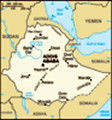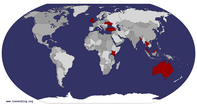COMING SOON HOUSE ADVERTISING ads_leader
The purpose was simple, but the execution was difficult. The aim of visiting the tribes of Omo Valley tribes in south-western Ethiopia was an arduous experience that proved to be the most challenging of all my travels. The Omo Valley is renowned for the large diversity of tribes within a small area, tribes whose practices have not changed for millennia. Its remoteness and rugged conditions makes travelling there a true adventure, but for those who are willing to forgo basic comforts, it promises an experience matched by few other places.
My flight from Dubai on Ethiopian Airlines set the tone for this journey. In Ethiopia (as with many other places in the world) one is not supposed to place used toilet paper in the bowl, so the flight almost entirely composed of Ethiopian women returning to their home country regrettably followed this practice. The result was that the bathrooms were filled with used toilet paper piling onto the narrow basin and spilling onto the floor. The Singaporean gentleman sitting next to me was equally aghast as I was at this deteriorating sanitation – something which the cabin crew did not bother to rectify.
Arriving at the airport in Addis
Ababa, I was confronted with a ninety minute wait to obtain my visa on arrival. The fairly small line moved as if was treacle crawling uphill and it reminded of a theory by US comedian Jerry Seinfeld who described a version of hell as being an endless cycle of travel between the departure and arrival terminals of airports. Perhaps Mr Seinfeld was referring to enduring the departure process at Ben Gurion Airport in Israel and the arrival process at Bole International Airport in Ethiopia.
Though I boarded the plane in Dubai in 45 degree weather and disembarked four hours later to 15 degrees, it was still a pleasure to leave the airport with visa intact. Thankfully, my transport to the hotel went very smoothly (unlike my transport to the airport when my taxi ran out of petrol which almost caused me to miss the check-in deadline) and I was soon ensconced into the alternate world that is Ethiopia: a different use of time, deliciously and uniquely spicy food, and more idiosyncrasies than is possible to detail here.
A visit to the office of
Abeba Tours detailed my ten day itinerary; four days of road travel to reach and return

 Community totem - Konso, Ethiopia
Community totem - Konso, Ethiopia
A family places a new piece every 18 years, thus after 60-70 generations, this tower is 800 years old.from the Omo Valley, with the remaining days spent traversing the more remote areas of this region. Heavy rain heralded the following morning as we left the capital with our driver, Tsegaye, who was nothing short of remarkable. I would entrust him to drive me anywhere in the world under any conditions – not only for his driving ability but also his negotiation skills in securing the least hassle from local authorities and other people.
The first stop was to the Melka Kunture Prehistoric Site, where excavations have revealed evidence of civilisations dating back 1.7 million years. It was a very modest display, but in the final room I gazed at some fine obsidian axes, and the guide pointed out one that was 800,000 years old. Since nobody else was around I boldly asked, “Can I touch it?”, “No, not possible”, replied the middle-aged male guide in a thick accent, “You can hold this one,” as he lead me to another table, where a smaller and more crudely chiselled axe lay. “How old is this one?” I enquired, “That is one million years old,” he calmly answered, “One million years old!” I exclaimed in a rush of excitement, and

 Laughing Konso girl, Ethiopia
Laughing Konso girl, Ethiopia
She looked so serious to begin with so I told her "anchi konjo" (you are beautiful) and this was the result...carefully held the item in my hand. It was almost impossible to comprehend the astonishing progress of humans since this axe was carefully crafted from the most rudimentary of resources.
The remainder of the day was a long and tiring period of travel to the overnight stop of Abra Minch, which included a delicious lunch and a few bush-toilet stops due to the lack of any alternatives along the way. The recent rains coupled with the poor roads meant it was well after nightfall when we arrived. It was here that I made a most unpleasant discovery - my wallet was missing. When I discovered it was not in my pocket, I checked the floor, and when that failed to uncover anything (apart from empty water bottles), it was a search behind the seat, and so the process continued until every unbolted item in the vehicle was removed. There was too little interaction with other people for it to be stolen, so it must have fallen outside on one of the toilet stops. I was expecting myself to spew forth a stream of expletives, and though some did eventuate, I was far too peeved and tired to even bother.
Early the next morning another search of the vehicle confirmed the my wallet containing my driver’s license, airline loyalty cards and a pile of local currency (the Ethiopian Birr) was indeed missing; thankfully my passport, US dollars and ATM cards were still safe within my money belt. I needed to inform my insurance provider of the loss by using one of the world’s slowest Internet cafes, but that was easy compared to obtaining a police report. Ethiopian police are adept at avoiding paperwork by referring people to other police stations. Tsegaye was superb at this time, but after spending more than 90 minutes seeing numerous personnel at two stations, Tsegaye eventually conceded with a slightly embarrassed laugh, “you will not get a report,” and it was obvious that short of a bribe, nothing would eventuate.
This futile search was causing problems with our schedule, so after visiting a bank to replenish my Birr, we journeyed along twisting roads towards Dorze, a small town nestled amongst the mist-covered hills. Stepping from the vehicle in the swirling mist that coated an open air market was most memorable, and the sodden muddy ground made traversing anywhere difficult, but the numerous curious

 Double time in Ethiopia
Double time in Ethiopia
Two methods of telling time - one that counts midnight as 12 o'clock, and the other that counts 6 o'clock as 12 o'clock.children following me seemed to have no such problems. This included a small girl carrying two chickens that looked huge compared to her tiny frame, but she dutifully held these fowl for almost an hour.
The night was spent in a cultural village where oversized and elongated wooden huts dotted the landscape. Many aspects of traditional Dorze life were displayed and explained – including the making of traditional breads and clothes, and using internal fires to smoke the huts daily to keep termites at bay. It was most interesting to wander the village and meet the local people, one a young lady of no more than nineteen who was already married and proudly showed me her baby. I could not help but wonder how much different her life would have been had she been born in another part of Ethiopia, let alone another part of the world; and after talking to her, it became apparent that she wondered about the same thing.
That night the Dorze people gave a traditional music and dance performance for the half dozen tourists in the cultural village, but I was the only one who dared to don the animal skins and dance
around the roaring fire. The vibrant and energetic singing, clapping and dancing was infectious; music is an integral part of Africa and it is almost impossible to not be seduced by its captivating sounds. In places such as Dorze without television, music is an important form of leisure not fully appreciated by those of us from countries where options for entertainment can take many forms. This was a magical evening.
The next morning saw a continuation of the journey to the Omo Valley, and we passed villages where children herded cattle that often seemed to obstruct our passage, and where women would walk kilometres to collect fresh water. Younger folk could identify a vehicle containing a foreigner from a distance as they would dance, shake their legs or do headstands in the hope that such antics would result in some sort of cash donation – a rather unusual form of busking. Others would take a more direct approach and run alongside the car screaming “you, you!”, “hello, hello!’, “pen!” or “Highland!” (a mineral water brand that signified a request for empty plastic bottles).
Along this journey was a brief stop at a traditional village near Konso that was
filled with kindly, but shy people. Gone was the constant asking for pens or empty plastic water bottles, it was a refreshing change from the rest of my time in the country. However, not everything improved the further we travelled, for the standard of accommodation deteriorated, and the quality of food significantly diminished.
After Konso, our vehicle crossed some surprisingly good roads undergoing renovation to further improve tourist and other access to this south-western portion of Ethiopia. I wonder how such increased tourist traffic would impact on the lives of the traditional tribes, but that would be revealed in due course. The number of children on the road became fewer and so did other vehicular traffic. We paused for a final time at a lookout where one could barely discern Kenya to the south and Sudan to the west. Most importantly, beneath me lay the Omo Valley. I trudged back to the vehicle, Tsegaye restarted the engine, and we began our descent to the very edge of civilisation...
COMING SOON HOUSE ADVERTISING ads_leader_blog_bottom
Tot: 0.075s; Tpl: 0.018s; cc: 14; qc: 34; dbt: 0.0303s; 1; m:domysql w:travelblog (10.17.0.13); sld: 1;
; mem: 1.2mb







































deleted_49612
deleted_49612
Missing wallet: This also happened to me on my last trip. One would think we would be too wise after all the travelling we have done, for things like that to happen to us. ;) I haven't been robbed or lost my valuables while travelling since 21 years ago in Hungary. Here is my story. http://www.travelblog.org/Asia/Malaysia/Kelantan/Kota-Bharu/blog-549847.html